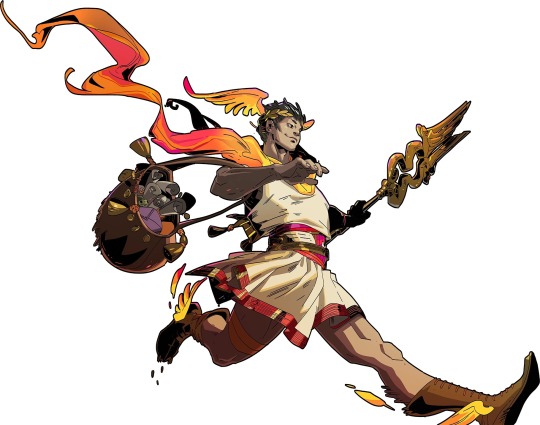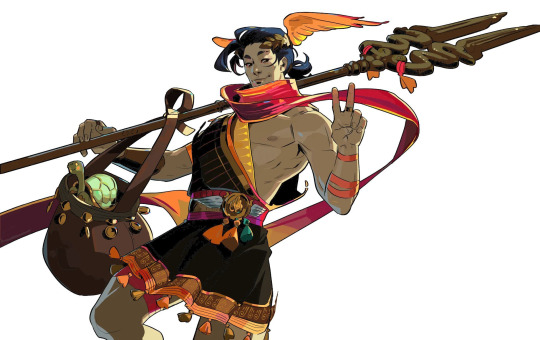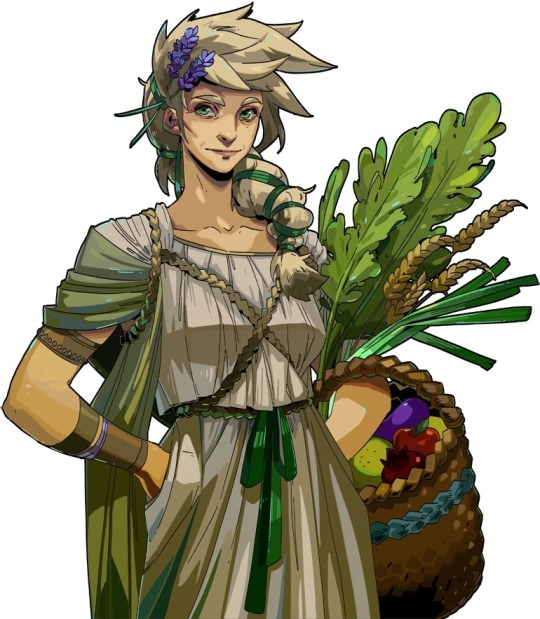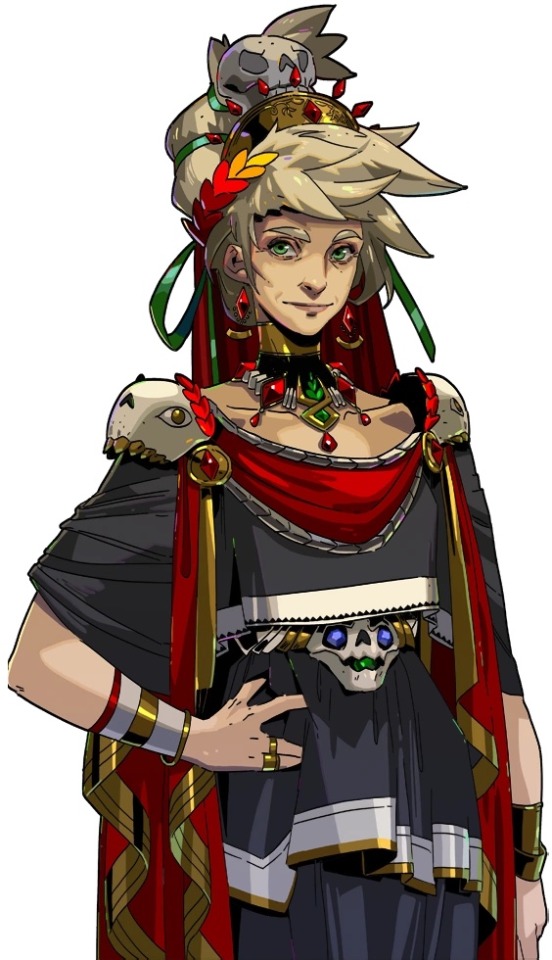#just even the idea that Hermes belongs more to the chthonic gods than the Olympians
Text
OFFICIAL RELEASE SO IM BRINGING THIS BACK—
yk Hermes’ new design? Kinda reminds me of smth…




#hades 2#hades game#hermes#charmes#listen#I’m not saying charmes are married#but I’m not NOT saying charmes are married#I am so not normal about this#I genuinely feel insane#please hades game enjoyers see what I see#i beg of you#also it could not be marriage!!#just even the idea that Hermes belongs more to the chthonic gods than the Olympians#just like Persephone#like just that he is a part of their lil family#idk I’m just soft about him I love him#he’s my little guy
582 notes
·
View notes
Text
We’re All Different and We’re All the Same (aka Examining Chthonic and Olympian Deity Distinctions)
Not going to bury the lede on this one. This paper deals specifically with the idea that chthonic gods should not be considered a class apart from Olympian (ouranic) gods and should instead be considered something akin to different aspects of the same god and/or just a title. And instead of drawing boxes and putting deities into firm “this deity is a chthonic deity and we worship them in x, y, z manner because they are chthonic” and “this deity is Olympian so we worship them in a, b, c manner because they are Olympian” we should instead approach each deity as an individual entity and decide: why are we worshiping this deity today? What aspect are we honoring? What is the most appropriate method to worship this aspect?
Chthonic gods are gods of the realm beneath the earth, which is the realm of souls. They are not gods of the souls for, strictly speaking, only living men worship the gods. They are rulers of souls; while from the standpoint of men who offer them worship, they are gods whose home is below the earth, gods who are associated with souls.(246)
Fairbanks starts by examining instances of Olympian vs Chthonic mentions in literature. By doing this he points out while the terms Olympian and and chthonic gods are divided by their domains (chthonic being of or below the earth—Olympian being the deities of the space above earth’s crust), Aischylos and Sophocles use a word that translates better to “resting place of souls” or “spirits of the dead” rather than agricultural ties as is often argued. Fairbanks goes on to point out that, “The number of gods who are thus connected with souls and with the abode of the dead are quite limited. They may be divided into two classes: gods who have no other function, and gods who are connected with the Olympic group, but who also have something to do with souls”(243). He mentions that the Erinyes [the Furies], Ge [Gaia], Hermes, Demeter, Persephone, Hekate, and Zeus all have strong ties in literature to the realm of the dead and/or to the souls of the departed.
We’ll note at this time that Zeus, Hermes, and Demeter all are considered “Olympian” despite these ties. Hermes is the best known for being the herald and guide of the dead. Souls, especially freshly departed ones, were considered under his care. Demeter is not tied to the “chthonic” epithet in the poetry samples Fairbanks studied however he does point out that Herodotus tied her chthonic aspect to her role as “goddess of the Mysteries” since the Eleusinian goddess granted special blessings after death(245). Zeus is something of an odd duck since we really do not normally associate him with the realm of souls—yet Fairbanks points out that Zeus’ thunder reaches the underworld in Homer’s poetry, as well as Attic tragedies, Cretan poetry, Sophocles, and Aischylos. In fact, in Aischylos, the thunder is specifically referred to as chthonic thunder since it “comes from the earth” (245) (probably referring to earthquakes? It is not clear). Even Apollo is mentioned at least once as tending to souls. (246)
Fairbanks sums it up best: “The truth seems to be that this connection between gods of the earth as receiving the dead (a poetic use) and gods of the earth as producing the grain (a cultus use) is purely local. […] It is only in the Peloponese, however, that any close connection between agricultural deities and chthonic deities proper can be proved.” (247-248) He goes on to posit that it is probably best to use chthonic only for gods that are associated with souls, not all gods who are given the chthonic title at times (like Apollo, Artemis, Poseidon, the wind daimones, heroes, etc).
Moving on to state worship and local cultus, Fairbanks had this to say about ritual, worship and the Olympian/Chthonic deities:
“Later the connection of the gods with state worship was so intimate, the fortunes of the god were so bound up with the fortunes of the state itself, that is hardly possible to conceive of a national god as being angry with the state where he was worshipped except in case of gross neglect or insult. […] The question whether or not it was acceptable to the god would not arise, for both god and ritual had become part of the state life. […] The chthonic gods with all their uncanny associations clearly belong to the latter class of divinities, whose anger is easily roused, but who have the power to send special blessings. At the same time this class is not limited to the chthonic gods, for it includes heroes as well as Olympic divinities who have nothing to do with souls.” (250)
I know it’s a long quote but let’s break it down. Fairbanks is muddling all his timelines a bit but what he is talking about it how as time progressed in the ancient Greek empire—religion became more and more of a loud, public affair. There is a lot of literature discussing how rituals became more elaborate as time wore on because of the public aspect of it—with people watching, naturally the inclination was to be over the top to show publicly how ‘pious’ one was. However, the unintended consequence of the religion spreading and becoming mainstream in Greek life is that everyone had their own method of worship.
With priests often being elected officials that would only serve a year or two (with only a handful of noted exceptions), everyone brought what they could to offer their deity, whether or not it was a traditionally appropriate gift. I use this example every time but it’s still applicable: war spoils were a somewhat regular offering to Asclepius, god of medicine, especially after Alexander the Great began offering Asclepius shields from battles he had won. Weapons were also offered to goddesses like Aphrodite and Hera, despite them not originally having any war aspects. Everyday offerings were less from a prescribed list of goods and more what was available and what was from the worshipers hearts.
Bringing that back to chthonic deities—while the chthonic deities could bring down a fearful wrath if they were wronged they could also grant great boons. They were treated like all other deities otherwise. There were certain offerings made during high rituals and festivals, however, even during the festivals there were many examples of local cultus demanding something other than the traditional black animal and sober (wineless) sacrifice.
However, regarding their fearful wrath, Fairbanks points out scholars such as K.O. Muller suggest that only chthonic gods received propitiation offerings (appeasement offerings). Fairbanks disagrees with this assessment. While chthonic deities received the majority of the propitiation offerings there are almost no clear references to propitiation offerings to Hades or Persephone, except the ones mentioned by Homer.(253) There are also no clear references to any propitiation offerings to Demeter except for perhaps one sacrifice noted in Lykosoura. Hekate does have many references of propitiation sacrifices—“the blood of dogs was used to purify the superstitious, while the bodies were left at the crossroads”(254)—but Fairbanks points out that the dogs are not a typical propitiation sacrifice but instead unique to Hekate. In fact, the only regular recordings of what we would consider a “proper” propitiation sacrifice are given only to the Erinyes (the Furies). They are given black animals in all the areas that have shrines and rituals dedicated to them.
But wait, you might be asking yourself. Isn’t Zeus and other Olympian deities given propitiatory offerings regularly? Well, sure, they are. But they’re not all ‘traditional’ offerings and they are given for different reasons in different regions. In addition, with the clear evidence of propitiatory offerings given to Zeus, Apollo, Athena, the Winds, Artemis, etc, we can safely reject Muller’s opinion that only the chthonic gods were given these appeasement offerings. While the chthonic aspects of some of the gods may have received more offerings of the propitiatory type than the Olympian aspects they are not the only ones that the worshipers would seek to soothe. As a final note, Fairbanks points out these kinds of offerings and what was sacrificed in them is not unique to the gods but was also offered to the souls of the dead.
In conclusion, while ‘Chthonic’ is obviously a title distinct of certain aspects of gods—there is not sufficient evidence presented in ancient worship to hold them apart as totally separate deities who should be treated as a separate class of divinity. Because for every example of a “proper” chthonic ritual done to honor, say, Hekate, there are a handful or more examples of improper or even non-chthonic rituals to honor her. This holds true for all deities who hold the ‘chthonic’ title. Fairbanks says “The forms of worship correspond with the character of the gods,”(259) and I tend to agree with that assessment. Do not look at the epithets and aspects of the gods as individual parts you can take away and swap out. They are all the greater part of a whole being. While you can choose to not worship aspects or give praise to certain epithets—after all, they almost all came out of local cultus worship—they are a part of the gods’ history and thus a valid part of the divine being. So the idea that we can neatly box gods and goddesses into categories is short-sighted. Instead, examine each deity on their own terms and then decide how to approach them from that point. The chthonic aspects are as much of a regular part of a deity as their Olympian aspect. There is not some deep, abiding divide that is an insurmountable barrier. Love your deities as they are in whichever method that works for you and your worship practice. They have been here before and will understand.
Source: Fairbanks, Arthur. “The Chthonic Gods of Greek Religion.” The American Journal of Philology, vol. 21, no. 3, 1900, pp. 241–259. www.jstor.org/stable/287716.
#long post#chthonic#olympian#hellenic polytheism#sorry mobile users#songbird notes#i actually skipped two whole concepts just to shorten it!#just i haven't seen much/any discussion on this topic so i wanted to provide all possible backstory
21 notes
·
View notes